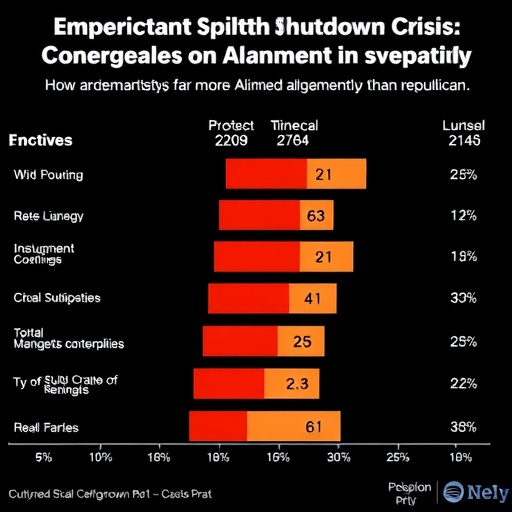Government Shutdown Crisis: Poll Shows Americans Split on Severity with Democrats Far More Alarmed Than Republicans
In a nation gripped by political gridlock, a new poll reveals that roughly half of Americans view the ongoing federal government Shutdown as a major problem, but the divide along party lines couldn’t be starker: Democrats are sounding the alarm at twice the rate of Republicans. This stark partisan split in public opinion underscores the deepening chasm in Washington as the crisis stretches into its third week, leaving thousands of federal workers unpaid and essential services in limbo.
- Poll Uncovers Stark Partisan Rift in Shutdown Perceptions
- Democrats Rally Against Shutdown’s Human and Economic Costs
- Republicans Defend Stance, Minimizing Shutdown’s Immediate Bite
- Real-Life Stories Illustrate Shutdown’s Uneven Toll on Families
- Experts Forecast Extended Standoff and Lasting Political Scars
The findings, from a nationwide survey conducted by the Pew Research Center between January 15 and 20, highlight how the Shutdown—triggered by disputes over border wall funding—has become a flashpoint in American politics. With 49% of respondents labeling the situation a “major problem,” the poll captures a snapshot of frustration amid economic uncertainty. Yet, while 72% of Democrats see it as severely damaging, only 28% of Republicans agree, reflecting entrenched views on government spending and immigration policy.
Poll Uncovers Stark Partisan Rift in Shutdown Perceptions
The latest poll data paints a vivid picture of America’s polarized landscape. According to Pew, overall public opinion on the shutdown shows 49% considering it a major issue, 32% a minor one, and just 17% dismissing it as not a problem at all. But when broken down by party affiliation, the numbers diverge dramatically. Among Democrats, 72% rate the shutdown as a major crisis, compared to a mere 28% of Republicans. Independents fall somewhere in the middle, with 45% viewing it seriously.
This partisan gap isn’t new, but it’s widened during this prolonged standoff. “The shutdown has amplified existing divisions,” said Lee Drutman, a senior fellow at New America who studies political polarization. “Democrats see it as a needless assault on public services, while many Republicans frame it as a necessary stand against wasteful spending.” Drutman’s analysis aligns with the poll’s trends, which show that support for the shutdown correlates strongly with views on President Trump’s border security agenda.
Further granularity in the poll reveals regional variations too. Urban dwellers, who lean Democrat, are 15% more likely to call the shutdown catastrophic than rural respondents. Younger Americans under 30 express heightened concern at 58%, possibly due to fears over student loan processing delays and national park closures affecting travel plans.
Democrats Rally Against Shutdown’s Human and Economic Costs
Democrats are leading the charge in decrying the shutdown‘s ripple effects, with poll respondents from the party citing immediate hardships for furloughed workers and vulnerable communities. House Speaker Nancy Pelosi has been vocal, stating in a recent press conference, “This shutdown is hurting real people—air traffic controllers working without pay, Coast Guard families scraping by. It’s time for Republicans to put country over politics.” Her words echo the sentiments of 72% of Democrats in the Pew poll, who worry about long-term damage to government trust.
The economic toll is mounting. The Congressional Budget Office estimates the shutdown could cost the U.S. economy up to $1.5 billion per week in lost productivity. Federal employees, numbering over 800,000, are facing their first missed paycheck this week, leading to stories of financial desperation. In a focus group highlighted by the poll, a Democrat from Virginia, a TSA screener, shared: “I’m working 10-hour shifts without pay, dipping into savings for my kids’ school lunches. This isn’t governance; it’s cruelty.”
Beyond paychecks, Democrats point to broader impacts like delayed IRS refunds, halted food safety inspections, and closed national landmarks. The poll found that 65% of Democrats believe the shutdown endangers public health, a concern amplified by reports of understaffed FDA labs unable to process critical drug approvals. Environmental protections are also at risk, with the EPA’s monitoring programs paused, drawing ire from progressive leaders who see it as an assault on climate initiatives.
In Congress, Democrats have proposed multiple funding bills to reopen the government without wall concessions, but they’ve been blocked by Republicans. Senate Minority Leader Chuck Schumer tweeted, “Public opinion is clear: Americans want this shutdown over. Why won’t the President listen?” This push reflects the party’s strategy to leverage the poll‘s findings to pressure the White House.
Republicans Defend Stance, Minimizing Shutdown’s Immediate Bite
On the other side, Republicans in the poll largely downplay the shutdown‘s severity, with only 28% calling it a major problem. Many view it as a worthwhile trade-off for securing border funding, aligning with President Trump’s demands for $5.7 billion in wall construction. GOP leaders argue the economy remains robust, pointing to strong job reports and stock market gains as evidence that the shutdown isn’t derailing progress.
“This is about national security, not partisan games,” said Senate Majority Leader Mitch McConnell in a floor speech. “Temporary inconveniences pale against the threat of unchecked immigration.” This rhetoric resonates with Republican respondents, 62% of whom in the poll prioritize border security over immediate government reopening. Rural and Southern voters, key Republican bases, show even less alarm, with just 22% seeing the shutdown as problematic.
Despite the bravado, cracks are showing. Some Republicans, like Sen. Lindsey Graham, have urged compromise, warning that prolonged closure could erode public opinion. The poll indicates that while core supporters remain steadfast, moderate Republicans are shifting: 40% now favor negotiations, up from 25% pre-shutdown. Stories from affected GOP districts, such as unpaid USDA inspectors in farm states, are testing loyalties. One farmer from Iowa told pollsters, “I support the wall, but losing crop subsidies processing hurts my bottom line.”
Economically, Republicans highlight resilience. The Commerce Department reported a 0.3% GDP growth in Q4 despite the shutdown, bolstering claims of minimal impact. However, experts caution that deferred maintenance and backlogs could lead to future spikes in costs, a point Republicans counter by emphasizing fiscal discipline.
Real-Life Stories Illustrate Shutdown’s Uneven Toll on Families
Beyond the numbers, the shutdown is weaving personal narratives that cut across party lines, though public opinion remains divided. In the Pew poll‘s qualitative segments, Americans shared harrowing accounts of adaptation. A Democrat park ranger from Yellowstone described shuttered gates and lost tourism revenue: “Families planned vacations here for months; now it’s ghost towns, and we’re unpaid volunteers essentially.”
Republicans aren’t immune. In Texas, a Customs and Border Protection agent, a GOP voter, recounted working overtime without compensation: “I get the mission, but my wife had to pick up extra shifts at the diner. It’s straining everyone.” These anecdotes humanize the poll‘s stats, showing how the shutdown disrupts daily life unevenly—urban Democrats fret over delayed WIC benefits for low-income moms, while Republican-leaning military families grapple with commissary closures.
Non-partisan impacts are stark too. Small businesses near federal sites report 20-30% revenue drops, per National Federation of Independent Business surveys. Veterans’ services delays have sparked bipartisan outrage, with 55% of all respondents in the poll calling it unacceptable. Immigrant communities, caught in the policy crossfire, face prolonged asylum backlogs, amplifying humanitarian concerns.
The poll also touched on mental health strains, with 38% of affected workers reporting increased stress. Support groups have sprung up online, where federal employees swap tips on food banks and bill negotiations, transcending party divides in shared hardship.
Experts Forecast Extended Standoff and Lasting Political Scars
As the shutdown drags on, political analysts predict no quick resolution, with public opinion potentially shifting further against the party in power. The Pew poll suggests that if unresolved by month’s end, overall concern could rise to 60%, pressuring Republicans to budge. “History shows shutdowns erode support for the instigator,” noted Brookings Institution scholar Darrell West. Past episodes, like the 2013 standoff, cost Republicans dearly in midterm polls.
Forward-looking, the crisis could reshape 2020 election dynamics. Democrats aim to weaponize the shutdown in fundraising and messaging, while Republicans bet on economic strength to weather the storm. Bipartisan talks, mediated by Vice President Pence, are slated for next week, but optimism is low. If funding lapses continue, Treasury warns of debt ceiling complications by March, risking a deeper recession.
For everyday Americans, the path ahead involves resilience amid uncertainty. Community aid networks are expanding, and some states are offering loans to furloughed workers. Ultimately, resolving this shutdown may hinge on bridging the partisan chasm revealed in the poll—a tall order in today’s fractured Washington. As one independent respondent put it, “We need leaders who govern, not grandstand.” The coming weeks will test whether compromise prevails over continued division.








